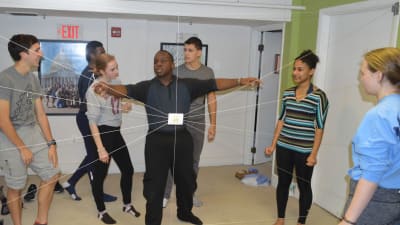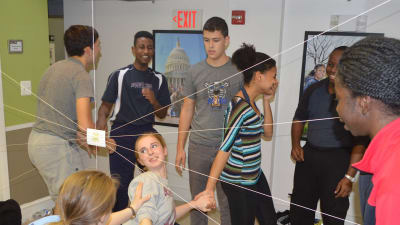Spring 2015 begins with visits from Egil “Bud” Krogh; Paige Cottingham-Streater
Just eight days ago, our Spring 2015 students had never met each other. We are thrilled with how close they are growing after just one week! On Monday morning, we dove straight into Ethics & Leadership class with a longstanding SEGL tradition: “The Infamous Skittles Scenario.” Over the course of forty-five minutes, our students put their ethical thinking skills on display as they asked themselves some of life’s most challenging questions: How would you live if there were no rules? Are humans innately altruistic or selfish? What is the ideal form of government? Along the way, they “shot” each other, helped each other recover from various ailments, bartered for various resources, and consumed many Skittles. (You can read the Skittles Scenario “assignment” sheet here.)
After a lively ensuing discussion, we delivered a brief introductory lecture on three classic Western ethicists: Aristotle, Kant, and John Stuart Mill. Their philosophies are just one set of tools these students will acquire this spring as they learn to make and evaluate ethical leadership choices; they will return to the ideas of these three thinkers throughout their time at SEGL. (Want to see the lecture? You can view the version we use for our online Integrity 101 class here.)
After E&L, we began the “traditional” classes that every SEGL student takes: English, History, Math, Language, Science, and a few special independent studies. These courses find myriad ways to intersect with the Ethics and Leadership curriculum while staying true to the needs of each student’s sending school.
On Wednesday morning we delivered one of several first-week orientation sessions: an exploration of the latest scientific research about how students learn. (Our orientation sessions help our students adapt to SEGL’s learning culture and to each other’s ideas and perspectives. Later sessions included a study skills session, an academic honesty conversation, and a discussion of our summer reading book, The Reluctant Fundamentalist.)
What does the latest brain science show? Perhaps most important, it shows that intelligence is malleable (not fixed), and that students who believe this perform much better on tests. In fact, praising students for “being smart” can be detrimental; praising them for “working hard” usually produces better results. Furthermore, the best kind of “working hard” happens when you operate at the outer limits of your brain’s current capabilities; despite the many mistakes this will cause, it is the fastest way to progress. (If you would like to read more, check out The Talent Code by Daniel Coyle, Mindset by Carol Dweck, and Why Don’t Students Like School? by Daniel T. Willingham.) Our faculty members have been trained in this science and use it to assist their teaching.
We then welcomed Egil “Bud” Krogh for the first of two visits. Known to historians as the Director of Nixon’s White House Plumbers (which investigated and attempted to discredit Daniel Ellsburg after the release of the Pentagon Papers) he is also the author of Integrity: Good People, Bad Choices, and Life Lessons from the White House. Many students found him to be a master storyteller: he shared the now-famous tale of Elvis Presley’s visit to the White House (Krogh, Elvis, and Nixon were the only officials in the Oval Office that day), a cautionary anecdote about the fat content in the hot dog, a story about his intuition and a Supreme Court nominee who might have been racially biased, and an insider account about the illegal break-in he authorized at Dr. Lewis Fielding’s office in the wake of the release of the Pentagon Papers.
Each story was designed to help students remember one of their most important take-aways of the semester: Krogh’s “Integrity Zone” decision making matrix. The system helps students recognize when their decisions might be affected by internal and external threats to Integrity (for example, “groupthink,” “pressure for results,” and “arrogance”). It also helps them understand why others–like Krogh–might have made wrong turns.
Following Krogh’s visit, SEGL Board of Trustees Board Vice Chair Paige Cottingham-Streater joined us for a session on cross-cultural ethics. As Executive Director of the Japan-U.S. Friendship Commission, a federal agency designed to foster scholarly, cultural and public affairs activities between the two countries, she faces a different set of values and assumptions every day. Finding ways to bridge the primarily Western values and worldview that inform U.S. policymakers and the values and world views of foreign policymakers is an essential 21st century leadership skill, and Cottingham-Streater’s presentation gave the students much to reflect on.
On Friday, Krogh returned to SEGL for the first “Master Class” of the semester. Our “Master Classes”–intensive interactive sessions in which students have their work critiqued by experts–are special semester highlights. Over the course of several hours, Krogh walked students through a real, life-and-death crisis that he handled during his career at the White House, engaging the students in an intense discussion of how best to resolve it. Serving as mock White House advisors, the students offered intense, divergent, and thoughtful opinions on the best multifaceted, time-sensitive course of action. The conversation was fiery and showcased many different opinions, but you’ll have to ask the students themselves for more details – we don’t want to spoil the surprise real-life ending for future semesters! He also shared news of a coming major motion picture based in part on his book The Day Nixon Met Elvis (Kevin Spacey will play Nixon, Michael Shannon will play Elvis, and Tom Hanks’ son Colin will play Krogh!).
(Krogh also helps to lead SEGL’s ethics training program for businesses and organizations. For information on this professional development program, click here.)
Our next case study is the Rwandan genocide (and ways to address contemporary mass atrocities). Meanwhile, there will also be a Saturday night interactive game night, a Superbowl party on Sunday evening, and time to relax after this jam-packed first week.




















